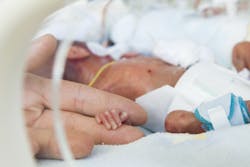An estimated 13.4 million babies were born pre-term in 2020, with nearly 1 million dying from preterm complications, according to a new report released by United Nations agencies and partners. This is equivalent to around 1 in 10 babies born early (before 37 weeks of pregnancy) worldwide.
Born too soon: decade of action on preterm birth, produced by the World Health Organization (WHO) and the United Nations Children’s Fund (UNICEF) together with PMNCH sounds the alarm on a “silent emergency” of preterm birth, long under-recognized in its scale and severity, which is impeding progress in improving children’s health and survival.
The report includes updated estimates from WHO and UNICEF, prepared with the London School of Hygiene and Tropical Medicine, on the prevalence of preterm births. Overall, it finds that preterm birth rates have not changed in any region in the world in the past decade, with 152 million vulnerable babies born too soon from 2010 to 2020.
Preterm birth is now the leading cause of child deaths, accounting for more than 1 in 5 of all deaths of children occurring before their 5th birthday. Preterm survivors can face lifelong health consequences, with an increased likelihood of disability and developmental delays.
Building from a report on the topic in 2012, this new, born-too-soon “decade” report provides a comprehensive overview of the prevalence of preterm birth and its profound impact on women, families, societies and economies.
Too often, where babies are born determines if they survive. The report notes that only 1 in 10 extremely preterm babies (<28 weeks) survive in low-income countries, compared to more than 9 in 10 in high-income countries. Gaping inequalities related to race, ethnicity, income, and access to quality care determine the likelihood of preterm birth, death, and disability, even in high-income countries.Southern Asia and sub-Saharan Africa have the highest rates of preterm birth, and preterm babies in these regions face the highest mortality risk. Together, these two regions account for more than 65% of preterm births globally. The report also highlights that the impacts of conflict, climate change and environmental damage, COVID-19, and rising living costs are increasing risks for women and babies everywhere. For example, air pollution is estimated to contribute to 6 million preterm births each year. Nearly 1 in 10 preterm babies are born in the 10 most fragile countries affected by humanitarian crises, according to a new analysis in the report.
Maternal health risks, such as adolescent pregnancy and pre-eclampsia, are closely linked to preterm births. This underlines the need to ensure access to sexual and reproductive health services, including effective family planning, with high-quality care in pregnancy and around the time of birth.
Leading up to the International Maternal Newborn Health Conference, in Cape Town, South Africa from May 8-11, WHO, UNICEF, UNFPA and PMNCH are calling for the following actions to improve care for women and newborns and mitigate risks from preterm births:
- Increased investments: Mobilizing international and domestic resources to optimize maternal and newborn health, ensuring high quality care is provided when and where it is needed.
- Accelerated implementation: Meeting country targets for progress through implementing established national policies for maternal and newborn care.
- Integration across sectors: Promoting education through the life cycle; supporting smarter economic investments, with co-financing across sectors; strengthening climate adaptation responses across the life-course; and advancing the coordination and resilience of emergency systems.
- Locally driven innovation: Investing in locally led innovation and research to support improvements in quality of care and equity in access.

